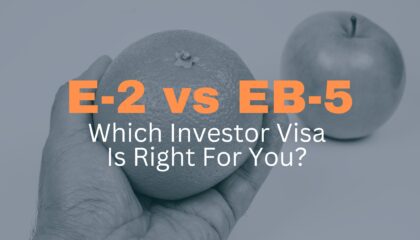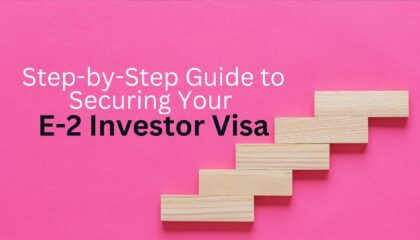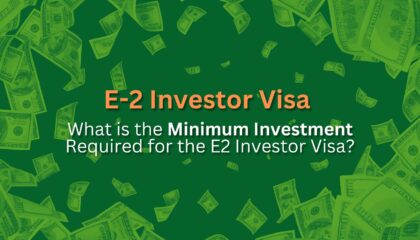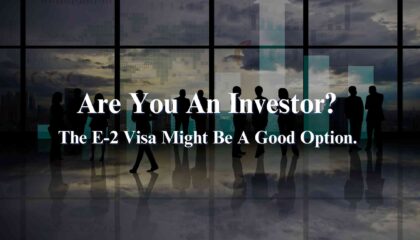E-2 Investor Visa – Comprehensive Guide to Investing in the U.S.

Table of Contents
- E-2 Investor Visa – Comprehensive Guide to Investing in the U.S.
Introduction
The E-2 Treaty Investor Visa is a valuable nonimmigrant visa category, specially crafted for individuals from countries with qualifying treaties with the United States. This visa serves as a unique avenue for foreign investors, granting them the opportunity to invest a substantial capital into a U.S. business enterprise and actively partake in its management.
In this guide, we embark on a comprehensive exploration of the E-2 Treaty Investor Visa, shedding light on its significance and the effective immigration legal services provided by Ochoa & Hill Law Group in Houston, Texas. Our mission goes beyond simply navigating the E2 application requirements and process; we aim to provide thorough insights into E-2 visa eligibility, the required forms, and the supporting documents necessary for a successful application process.

What is the E-2 Treaty Investor Visa?
The E-2 Treaty Investor Visa plays a crucial role in facilitating foreign investment in the United States. This nonimmigrant visa category offers a remarkable opportunity for investors from treaty countries to channel a substantial amount of capital into a U.S. business enterprise while actively participating in its management. It serves as a gateway to unlock investment opportunities and drive economic growth. To qualify, investors must make a substantial capital investment in a bona fide enterprise.

Who is Eligible for the E-2 Treaty Investor Visa?
The E-2 Treaty Investor visa is designed for individuals who are actively investing in and managing a U.S. business enterprise. An E2 applicant’s eligibility is primarily focused on whether a “substantial investment” has already been made, as well as determining what the applicant’s role within the business will be, which may be as a manager or executive. These individuals play a pivotal role in steering the success and growth of their U.S. businesses. The E-2 Treaty Investor visa is not just limited to owners of the treaty enterprise – employees may also qualify for an E-2 visa as well.

What are the Requirements for the E-2 Treaty Investor Visa?
Meeting the basic E-2 Visa requirements involves satisfying criteria outlined in the U.S. Department of State Foreign Affairs Manual1 (9 FAM 402.9). Key elements include:
- Treaty Country: A treaty of commerce exists between the U.S. and the E-2 treaty investor applicant’s country.
- Treaty National: The E-2 treaty investor possesses the nationality of the treaty country.
- Actual Investment: The applicant has invested or is in the process of investing in the treaty enterprise.
- Real Commercial Entity: The enterprise is a real and operating commercial entity.
- Substantial Investment: The investor’s contribution is substantial. There is no set minimum required to invest, but it should be proportional to the nature of the proposed investment enterprise.
- Marginality: The investment enterprise has the present and future capacity to generate enough income to provide more than a minimal living for the treaty investor and their family. What this means is that the company needs to be capable of generating a profit that would be more than just providing a living wage for the investor, such as having the capability of creating employment opportunities in the U.S.
- Executive/Director Capacity: The investor is in a position to develop and direct the enterprise. It is not enough for the E2 investor to simply invest capital into starting a business in the U.S. and have someone else run the operations. Part of the requirements of the E2 investor visa is that the investor should be in a position that is directing, managing, or supervising the business.

What Forms and Documents are Needed for the E-2 Visa?
If the E-2 Treaty Investor is applying outside of the United States, one of the primary forms required is Form DS-160, the Online Nonimmigrant Visa Application. Alongside this form, E-2 visa applicants must also provide documentation to support the substantial nature of the investment. In addition, when applying outside of the U.S., the E-2 investor applicant may also need to submit other forms, depending on the requirements of their country’s consulate.
Evidence to Include in E-2 Treaty Investor Application
For the most part, the vast majority of U.S. consulates across the globe will require similar documentation; however, every consulate has their own requirements and procedures as to how they will process, accept, and adjudicate the E-2 treaty investor applications they receive. Some of these documents include:
- A detailed business plan outlining the strategies and objectives of the U.S. business enterprise. Business plans are usually required for startup businesses. There are several companies online that actually specialize in creating business plans specifically for E-2 treaty investor visa applicants. Essentially, the business plans should include an evaluation of the local market / competition, along with a five-year forecast of financial gains and losses, as well as include a breakdown of investment enterprise’s initial costs required to begin operations.
- Documentation related to the investment enterprise’s ownership and formation such as:
- Articles of Incorporation or Organization
- Certificates of Shares or Operating Agreements
- Partnership / Joint venture agreements
- Foreign business registration records
- Concrete evidence of the substantial investment, showcasing the financial commitment and capital infusion. This evidence can be demonstrated with documents such as:
- Financial / Bank Statement
- Invoices
- Business Registration and Licenses
- Commercial Property Purchase / Lease Agreements
- Equipment Purchase Receipts
- Evidence demonstrating that the investment funds were legally sourced, and can include documents such as sale of property, inheritance, loans, sale of business, etc.
- Proof of the applicant’s qualifications and their pivotal role in the business as a manager or executive, highlighting their integral contribution to the business’s growth and success. This evidence can be demonstrated with document such as:
- Resume / CV
- Academic Degrees / Diplomas / Certifications / Qualifications

What are the E-2 Treaty Investor Countries?
Investors from various treaty countries, including Albania, Argentina, Australia, Belgium, Canada, and many more, can leverage the E-2 Visa opportunity. For a full list of E-2 Treaty Investor countries, visit List of E Treaty Visa Countries: Exploring Trade and Investment Opportunities in the U.S..
It’s important to note that the specific documentation requirements may vary based on the unique nature of the investment and the individual’s circumstances. Ochoa & Hill Law Group, based in Houston, Texas, is your unwavering partner, dedicated to guiding you through the E-2 Visa application process with skilled legal counsel. We are committed to helping foreign investors realize their investment opportunities in the United States, contributing to economic growth and success in the United States. Whether you’re a start-up entrepreneur or an experienced investor, we’re here to support your investment journey.
To ensure a seamless process, consider consulting with our experienced immigration attorneys at Ochoa & Hill Law Group. Contact us at (713) 984-4823 to schedule a consultation.
- U.S. Department of State Foreign Affairs Manual. Last Updated on October 5, 2023.
9 FAM 402.9: TREATY TRADERS, INVESTORS, AND SPECIALTY OCCUPATIONS – E VISAS ↩︎
Disclaimer: The information provided above is not intended as legal advice. Each immigration case is unique, and individuals should seek personalized legal guidance.








